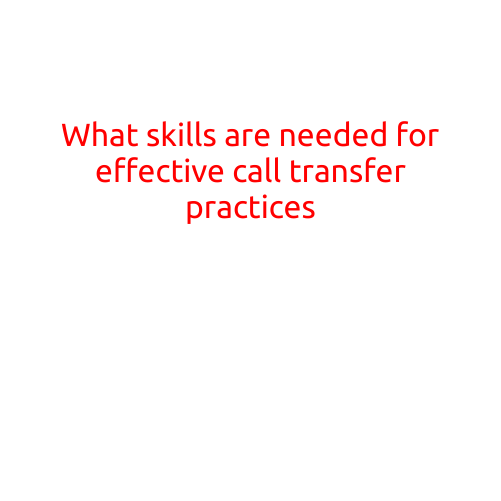
Here is a draft article on “What skills are needed for effective call transfer practices”:
What Skills are Needed for Effective Call Transfer Practices
In a fast-paced and competitive customer service environment, call transfers can make or break the customer experience. A seamless call transfer can resolve the customer’s issue efficiently, while a botched transfer can lead to frustration, delays, and ultimately, a lost customer. Effective call transfer practices require a combination of technical, communication, and problem-solving skills. In this article, we’ll explore the essential skills needed for successful call transfer practices.
Technical Skills
To transfer calls effectively, agents need to have a solid understanding of the technology and tools used during the call transfer process. These technical skills include:
- Familiarity with call transfer protocols: Agents should be aware of the different call transfer protocols used by their organization, such as blind transfer, attended transfer, and supervisory transfer.
- Knowledge of phone systems: Agents should understand how to use phone systems, including digital receptionists, auto-attendants, and voicemail systems.
- Familiarity with CRM software: Agents should be skilled in using customer relationship management (CRM) software to access customer information, log notes, and update records.
Communication Skills
Effective communication is a critical component of call transfer practices. Agents need to be able to:
- Clearly articulate the reason for the transfer: Agents should explain the reason for transferring the call to the customer and the new agent taking over the call.
- Provide context to the new agent: Agents should pass on relevant information, such as the customer’s concerns, previous interactions, and any outstanding issues.
- Ensure a smooth transition: Agents should make sure the new agent is fully informed and ready to take over the call, ensuring a seamless transition.
Problem-Solving Skills
Agents need to be able to troubleshoot and resolve issues that may arise during the call transfer process. These skills include:
- Identifying issues and finding solutions: Agents should be able to identify potential issues, such as technical problems or misunderstandings, and find solutions or escalate the issue to a supervisor.
- Being proactive: Agents should anticipate potential issues and take steps to prevent or mitigate them.
- Staying calm under pressure: Agents should remain calm and composed when faced with challenging situations, such as a difficult customer or a technical issue.
Additional Skills
In addition to technical, communication, and problem-solving skills, effective call transfer practices require:
- Attention to detail: Agents should be meticulous in ensuring that all relevant information is passed on to the new agent, including customer details, issues, and solutions.
- Active listening: Agents should listen carefully to the customer’s concerns and respond appropriately, ensuring that the customer’s issue is fully understood.
- Empathy and compassion: Agents should be able to show empathy and compassion to customers who are frustrated or unhappy with the transfer process.
- Adaptability: Agents should be willing to adapt to changing circumstances, such as a sudden surge in call volume or technical issues.
Conclusion
Effective call transfer practices require a combination of technical, communication, and problem-solving skills. By developing these skills, agents can ensure that call transfers are handled efficiently and professionally, resulting in improved customer satisfaction and reduced abandonment rates. Organisations should invest in training and development programs that focus on these essential skills to equip agents with the knowledge and skills needed to excel in call transfer practices.





